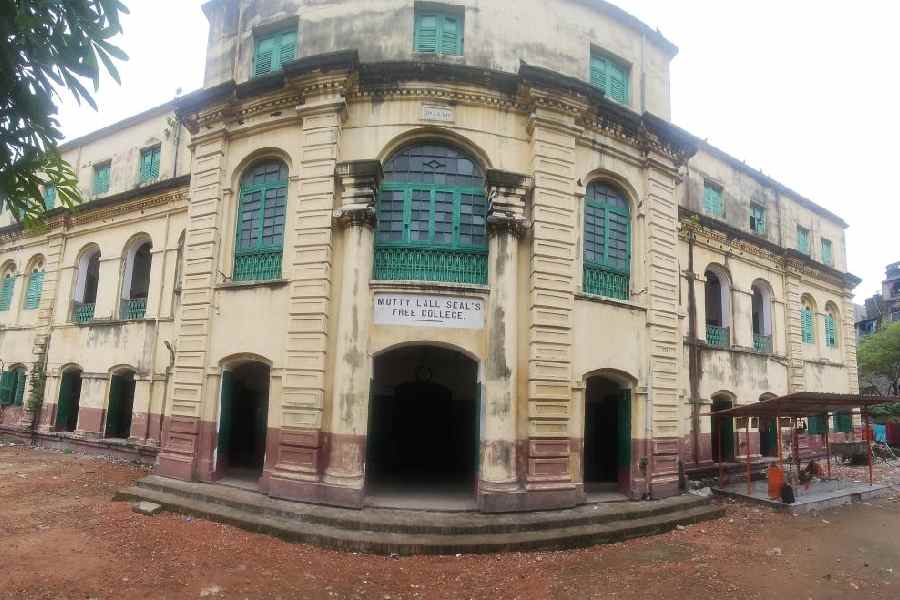If you are travelling along Chittaranjan Avenue, Calcutta’s north-south artery, you cannot miss the colossal three-storeyed yellow mansion with louvered green windows. Mutty Lall Seal’s Free College was built by merchant-philanthropist Mutty Lall Seal in 1842 to provide education to Indians and be a counter of sorts to the missionary educational institutions in the city.
“This college would have turned into India’s first modern university — Seal University — if Mutty Lall Seal had got adequate support from other wealthy Bengalis,” says Dr Sankar Kumar Nath, writer of the recently released Bengali biography Daanbir Mutty Lall Seal: Jiban, Kirti O Samakal.
“This was supposed to have happened in 1845, 12 years before Calcutta University, Madras University or Bombay University were founded,” he adds. The book was commissioned by Mohon Lall Seal, a sixth-generation descendant of Mutty Lall Seal.
“The philanthropic legacy of my ancestor is scattered throughout the city and the suburbs, but you won’t find any well-researched book on him,” says Mohon Lall, 82, who lives in an ancestral house in Shyambazar in north Calcutta. “His contributions as a social reformer are nearly forgotten today.”
Dr Nath visited several libraries, archives and rummaged through family papers for nearly a decade. He tells The Telegraph, “Mohonda helped me access a cache of photographs, paintings, legal documents, list of properties and the family tree.”
Calcutta is peppered with the living legacies of Seal. A bathing ghat on the Hooghly river with its majestic Corinthian pillars. Then there is the Durga Puja celebration at his Colootola house in central Calcutta. The street named after him is close to Dharamtala Market, which was once owned by him. Then, in the northern fringes of the city, one can find Seal’s Garden and an almshouse too. His descendants still congregate at the latter during ratha yatra.
“During his time, 500 people were fed daily,” says Mohon Lall. Apart from these, there are at least 200 tenanted houses and mansions listed as “properties of Mutty Lall Seal’s trust” scattered across Calcutta and Howrah.
Born in 1792 in a mercantile family in Colootola, Seal lost his father when he was five. He learnt basic English in two local schools and picked up calligraphy skills. He had an aptitude for arithmetic and learnt Shubhankari, the indigenous mental computation method, early on.
These basic skills and an innate business sense helped him rise from the position of a clerk at Fort William to the richest merchant in Bengal.
Seal’s first business venture was trading in bottles and corks for British beer importers. The huge profit from this business inspired him to forge partnerships with several British maritime traders. He traded in indigo, silk, sugar, rice, saltpetre and opium.
Mohon Lall recalls a family lore about his ancestor, how even blindfolded he pronounced correctly on a sample of indigo placed on his palm. And in doing so, won a bet with a European trader.
It was not long before Seal started an independent business. He got into the export and import of goods, bought a dozen merchant ships and even introduced steamships for domestic trade in India. He kept on rolling the millions earned as investments in new ventures ranging from tea trade to banking, insurance to real estate.
Apart from properties all over Calcutta, he purchased zamindari estates in Midnapore, Howrah and Burdwan districts, and even Bhagalpur in Bihar. It was said of him that anything he touched turned gold.
Seal also spent much of his hard-earned wealth on philanthropy. Kissory Chand Mitter, author of Life of Mutty Lall Seal (1869), expresses Seal’s views on charity thus: “I see around me rich men, possessing great funds and landed property. What I ask them is not to deprive themselves of their necessaries and comforts, but spare an infinitesimal portion of their luxuries for the homeless and the foodless.”
Dr Nath says he first learnt of Seal’s contribution when he was a student at Calcutta Medical College & Hospital. “We were told the MS Ward of the hospital was named after him.” Later, while writing a book on the history of the medical college, Dr Nath discovered that a large part of the land was donated by Seal.
He had also donated ₹12,000 for the construction of the main building with its Doric columns. A lesser known fact is that in 1838, he donated ₹1 lakh to build a maternity hospital inside Calcutta Medical College that extended its services especially to unwed mothers and widows. Other than these, he also funded a large number of schools and charitable dispensaries.
Seal’s contributions to social reform and women’s empowerment have somehow remained obscure. When a large section of babus, who were members of the orthodox Dharma Sabha, stood up against the abolition of Sati, he vehemently opposed them.
Years before Iswar Chandra Vidyasagar started his movement for the enactment of the HinduWidow Remarriage Act, 1856, Seal declared an award of ₹10,000 for the man who would come forward to marry a widow. In addition, he promised to pay ₹10,000 to the family of the widow who would get remarried. But there were no takers. He also set up a trust fund to provide a monthly pension for poor widows and orphans.
That is not all. When the son of the courtesan Heera Bulbul — immortalised in Sunil Gangopadhyay’s Sei Somoy — was refused admission in Hindu College, Seal and his merchant friend Rajendra Dutta set up the Hindu Metropolitan College for him. The college had to be closed down during the 1857 Revolt.
Seal was a man born way ahead of his time. The 19th-century newspaper Hindoo Patriot, says of his charitable work: “munificence… not stimulated by the love of fame or by the flattery of those who benefited by his gifts.”










